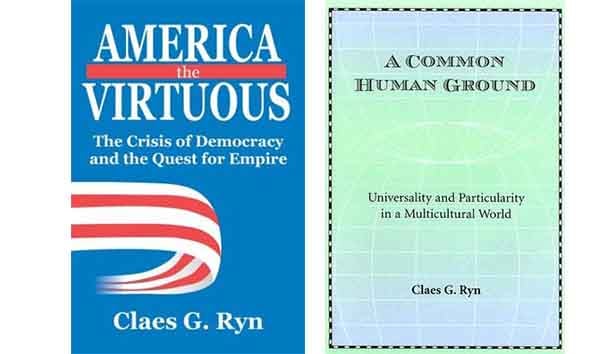We literate minority still at large here in the Dar al-Harb can learn much from Claes Ryn about our present condition and future prospects. In America the Virtuous, he makes a rigorous and definitive analysis of that phenomenon of “neoconservatism” that has converted the erstwhile American republic into a (self-)righteous empire.
Neoconservatism is really neo-Jacobinism, an elitist notion of governing the world according to certain abstractions alleged to be universal truths. Contrary to its promoters, as Ryn spells out beyond cavil, neoconservatism is both repulsive to the founding ideas of the United States and a pernicious heresy when viewed against the mainstream of Western civilization. Ryn’s greatest strength is his ability to assimilate the phenomena of current cultural and political life into meaningful patterns of intellectual history and then to detect and expose fashionable and destructive deviations from the Western tradition. His larger purpose is to preserve and perpetuate that tradition amidst inevitable change—a mission he pursues with poise, insight, and catholic spirit.
A Common Human Ground confronts the era of multiculturalism with the ancient home truth of Aristotle that harmony among men is a product not of uniformity but of genuine, mutually respectful diversity. Of course, multiculturalism, as promulgated and practiced in the United States, has nothing to do with the pursuit of cultural diversity. In fact, it has nothing to do with either culture or diversity. Its goal is to substitute a coercive uniform nonculture for the glorious diversity of Western civilization, for the profit of certain groups and the proletarianization of the majority. Ryn’s case is that respect for other cultures, and the peaceful coexistence of cultures, are only possible among people who are themselves conscious participants in their own, necessarily particularist culture. There is no universal culture. How could there be, when there is no such thing as a universal man? It takes nothing away from the author’s achievement to notice that we must be in very sad shape indeed to require such sophisticated intellectual enterprise to point out the obvious.
The provenance of A Common Human Ground is interesting: It grew out of lectures the author was invited to give at Beijing University. It seems that some thoughtful post-Marxist scholars there have interested themselves in the problem of how the unique cultures thrown up by history can be preserved amidst the rushing tidal wave of globalization. These scholars had, despite all the obstacles of language, poverty, and repression, somehow become acquainted with Professor Ryn’s writings and invited him to elaborate them. It is a real comfort to know that there are, somewhere in the world, at least a few representatives of an ancient culture, holding positions in its leading university, who yearn for cultural survival. Would that the same could be said about our country.
[America the Virtuous: The Crisis of Democracy and the Quest for Empire, by Claes G. Ryn (New Brunswick, NJ: Transaction Publishers) 228 pp., $34.95]
[A Common Human Ground: Universality and Particularity in a Multicultural World, by Claes G. Ryn (Columbia, MO: University of Missouri Press) 148 pp., $37.50]

Leave a Reply